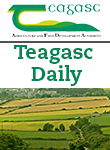
Questions and Answers with Organic Farmer Donal Keane
Type Media Article
Donal and Frederique Keane, Camelton Stud, Summerhill, Co Meath are organic suckler to beef and cereal farmers. A farm walk was due to take place on their farm. Organic Specialist Elaine Leavy got an update from Donal.
-and-his-son-John-(right)-364x350.jpg) Donal is pictured with his son John
Donal is pictured with his son John
Where did your interest for organic farming come from?
I had always been uncomfortable with the use of chemical fertilisers and sprays on grassland and crops but like everyone else thought that you couldn’t farm without them.
With the increasing cost of inputs and falling price of produce something had to give. I started researching other farming systems and spoke to a number of organic farmers.
I learned that, surprise surprise, you could actually grow grass and crops without chemical fertilisers and sprays.
One of the big questions for me was how to control weeds. I learned that weeds are an indicator of problems in the soil and that they can be controlled by the use of organic fertilisers and crop rotations so as to have the soil in really healthy condition and so reducing its susceptibility to weeds. Organic farming is a lifetime study of the soil. We all tend to concentrate on what happens above ground level whereas the really interesting stuff happens under our feet.
What changes have been made to the farming system since starting to farm organically?
We sowed 40 acres of red clover which produces free nitrogen from the air. Its silage is very high in protein. It can finish the Angus stock with little or no grains. This is important as organic grains are very expensive.
On the cattle side we started a suckler herd with 20 Angus cross cows running with an Angus bull. This breed suits the organic system; easy calving, vigorous calves and stock that finish well off grass or off red clover silage.
We increased our tillage area significantly. We started to grow oats on contract for Flahavans and this has been a good part of the enterprise here. As long as the quality and yield are good it is a worthwhile crop. Flahavans are a good company to deal with for us. With all cereal crops in organics you do, however, have to factor in the soil preparation issues and costs. Each three years of crop rotations is preceded by at least three years of red clover in order to build up nitrogen and organic matter in the soil.
This year we are growing three different varieties of oats. We are also growing three varieties of heritage wheat on field scale. We are trying to produce flour high enough in protein (12.5%) to make sourdough bread. This is not achievable with modern varieties in this country. We are trying to grow what our ancestors grew some generations ago.
 Photo of trial plots of heritage wheats
Photo of trial plots of heritage wheats
What are your future plans for the farm?
More cereals and less cattle. More attention to hedgerows and tree planting around the farm. More bird boxes and increasing numbers of bee hives. We are always looking to get off the beaten track in terms of produce and we would like to increase direct sales to the consumer.
What do you see as the challenges for the organic sector?
To get bigger! The sector here is tiny but still very vibrant with a lot of people who are really passionate about healthy soil and healthy food. Hopefully, with the Farm to Fork initiative from the EU Commission the government will soon start to put a bit of oomph into organics in this country. We are well behind many other countries in organic production here but we are fast learners and especially so when we have ever increasing markets ahead of us. All we need now is some real government support behind us.
How do you see yourself dealing with these challenges?
We will continue to spread the word on organics whenever we can. The farm walks are a great way to do that. To help with that our kids started an Instagram page for the farm. It is keanes_organic. They haven’t thought me how to log on to it yet so goodness knows what’s in there but I’m told that it has a lot of followers so hopefully it will help spread the word. We are going to keep trying to anticipate the market in terms of demand for high end organic food and to help fill that demand.
For information on organic farming go to www.teagasc.ie/organics
